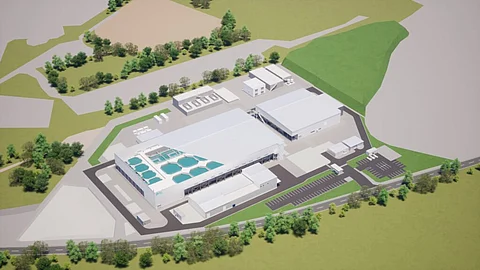

FRD Japan has decided to build a commercial Closed-RAS land-based rainbow trout farming facility in Chiba, Japan. Thus, the initial plan calls for a production of 3500 metric tons of trout annually starting in 2027. In addition, to achieve this commitment, FRD will raise funds through a new equity allocation and third-party loans using its framework for sustainable blue finance.
This project addresses the increasing demand for high-quality seafood products by promoting sustainable aquaculture. In Asia, where warm water temperatures make it challenging to raise salmonids in the sea during summer, land-based aquaculture offers a year-round cultivation solution. Therefore, FRD's Closed-RAS system uses advanced technology to maintain water quality without relying on the sea, reducing costs and disease risks.
Specifically, FRD's Closed-RAS System provides advanced filtration using bacteria to maintain water quality through closed recirculation of the breeding water without using natural seawater. This significantly reduces the cost of water temperature control during water intake and the risk of fish disease infestation, which until now have been high-cost factors in conventional land-based aquaculture.
FRD has operated pilot plants for trout farming in Chiba and Saitama for five years. Over the years, the experimental plants have successfully grown over 20 generations of fish, showcasing stable trout production without any dependence on the sea.
Thus, starting with this first commercial plant, FRD aims to develop multiple land-based plants for salmonid farming. Concretely, achieving a maximum capacity of 10,000 metric tons per plant, mainly in Asia, including Japan.
For the time being, the funds to be raised by FDR will be used for the construction of the commercial plant. Moreover, it will pay the cost for working capital, research and development, and investment (including the costs of the pilot plant currently in operation and preparations for the future development of a full-scale plant).
In addition, the company is considering a capital increase through the allotment of new shares to third parties. FRD has reached agreements with Air Water Inc, STI Food Holdings, Inc, Sekisui Chemical Co, among others. Thanks to this, they raise a total of CNY 21 billion (EUR 2,6 billion /USD 2,9 billion) through a third-party allocation of new shares.
The company has also raised funds through the company's framework for blue sustainability financing. Thereby, FRD has entered into a loan agreement with The Keiyo Bank, Ltd., Sumitomo Mitsui Trust Bank, Limited, and Resona Bank, Ltd. to finance the construction of the commercial plant.
FRD Japan pioneers the future of fish-eating culture through groundbreaking land-based aquaculture that breaks free from sea dependence. With a focus on sustainable practices, they employ the Closed RAS system. Their major goal is to revolutionize fish production worldwide, leaving a positive impact on the environment and delivering safe, and fresh.
